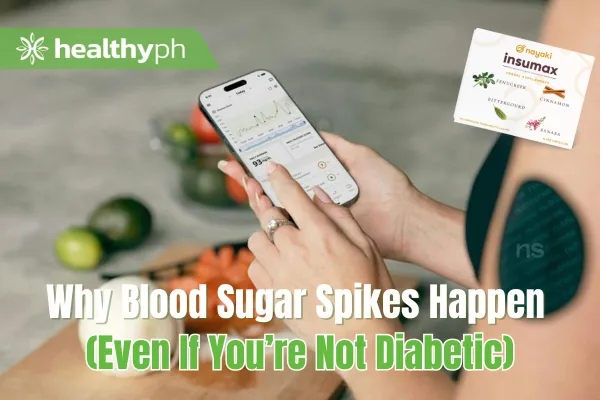
Why Blood Sugar Spikes Happen (Even If You’re Not Diabetic)
Did you know that blood sugar spikes can happen even if you're not diabetic? It’s more common than you think. While most people associate high blood sugar with diabetes, even healthy individuals may experience sharp rises in glucose—especially after meals or stressful days.
At Healthy PH, we believe that awareness is the first step to prevention. Let’s explore the surprising causes of blood sugar spikes in non-diabetics—and what you can do to manage them naturally.
1. High-Carb or High-Sugar Meals
Refined carbs like white bread, pasta, and sugary snacks cause rapid glucose absorption, which can overwhelm your insulin response—even if you don’t have diabetes.
Tip: Choose complex carbs and pair them with fiber, protein, or healthy fats to slow digestion.
2. Poor Meal Timing or Composition
Eating carbs alone without protein or fiber can lead to faster glucose spikes. Skipping meals or irregular eating can also heighten your body’s response when you finally eat.
Tip: Balance is key. Think “protein + fiber + healthy fats” in every meal.
3. Stress and Lack of Sleep
Both stress and sleep deprivation elevate cortisol, a hormone that:
Increases insulin resistance
Stimulates your liver to release more sugar into your bloodstream
Result: You wake up with higher fasting blood sugar or experience mid-day crashes.
4. Inactivity
Without regular movement, your muscles don’t absorb glucose efficiently. This means post-meal sugar lingers longer in your blood.
Solution: Even a 10-minute walk after eating helps.
5. Genetics or Early Insulin Resistance
You might not have diabetes, but if you have PCOS, metabolic syndrome, or family history, you could already be insulin-resistant.
Symptoms to watch for: Fatigue, belly fat, cravings, or skin tags.
6. Alcohol and Caffeine
Both can disrupt your body’s glucose regulation. Caffeine may raise blood sugar slightly in sensitive people, while alcohol may impair your liver’s ability to manage glucose properly.
Tip: Monitor how you feel after drinking and consider limiting intake if you notice symptoms.
7. Normal Glucose Fluctuations
Even healthy individuals experience short-term spikes:
After meals
During workouts
Due to hormones (e.g., menstrual cycle, puberty)
The key is how fast your body returns to normal. If your levels stay high for too long, that’s a red flag.
Should You Be Concerned?
Yes—if you experience:
Post-meal readings above 140–160 mg/dL
Fatigue, brain fog, mood swings, or intense hunger
Frequent episodes of dizziness or energy crashes
Consider: Getting a fasting blood sugar test or using a glucose monitor to track your responses.
Natural Support for Blood Sugar Management
At TheHealthyPH.com, we promote natural, science-backed ways to support balanced glucose levels. One of our top picks is Nayaki Rizomin Plus—a powerful blend of turmeric and black pepper extract known to help with inflammation and metabolic health.
Takeaway
You don’t need to be diabetic to experience blood sugar issues. The earlier you understand your body’s signals, the better you can support your health with lifestyle changes and herbal solutions.
Stay informed, stay balanced, and stay well—The Healthy PH Way.
Join our Community to get early access to herbal insights, lifestyle tips, and expert-backed health content.